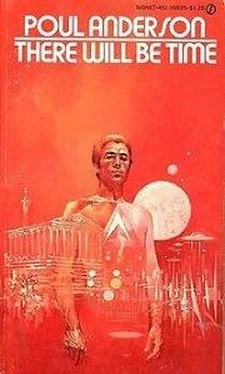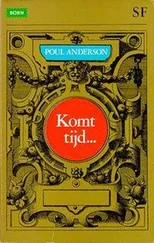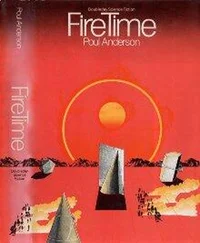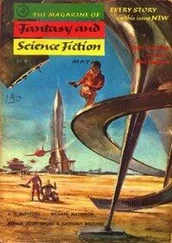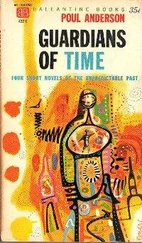Poul Anderson - There Will Be Time
Здесь есть возможность читать онлайн «Poul Anderson - There Will Be Time» весь текст электронной книги совершенно бесплатно (целиком полную версию без сокращений). В некоторых случаях можно слушать аудио, скачать через торрент в формате fb2 и присутствует краткое содержание. Год выпуска: 1972, Издательство: Doubleday, Жанр: Фантастика и фэнтези, на английском языке. Описание произведения, (предисловие) а так же отзывы посетителей доступны на портале библиотеки ЛибКат.
- Название:There Will Be Time
- Автор:
- Издательство:Doubleday
- Жанр:
- Год:1972
- ISBN:нет данных
- Рейтинг книги:5 / 5. Голосов: 1
-
Избранное:Добавить в избранное
- Отзывы:
-
Ваша оценка:
- 100
- 1
- 2
- 3
- 4
- 5
There Will Be Time: краткое содержание, описание и аннотация
Предлагаем к чтению аннотацию, описание, краткое содержание или предисловие (зависит от того, что написал сам автор книги «There Will Be Time»). Если вы не нашли необходимую информацию о книге — напишите в комментариях, мы постараемся отыскать её.
Nominated for Hugo Award for Best Novel in 1973.
There Will Be Time — читать онлайн бесплатно полную книгу (весь текст) целиком
Ниже представлен текст книги, разбитый по страницам. Система сохранения места последней прочитанной страницы, позволяет с удобством читать онлайн бесплатно книгу «There Will Be Time», без необходимости каждый раз заново искать на чём Вы остановились. Поставьте закладку, и сможете в любой момент перейти на страницу, на которой закончили чтение.
Интервал:
Закладка:
(“If anything does change man,” he said, “it’s science and technology. Just think about the fact — while it lasts — that parents need not take for granted some of their babies will die. You get a completely different concept of what a child is.” He must have seen the memory of Nora flit across my face, for he laid a hand on my shoulder and said: “I’m sorry, Doc. Shouldn’t have mentioned that. And never ask me to take a camera back to her, or a shot of penicillin, because I’ve tried altering the known past and something always happens to stop me …
Think of electric bulbs, or even candles. When the best you’ve got is a flickering wick in a bowl of oil, you’re pretty well tied to daylight. The simple freedom to stay awake late isn’t really that simple. It has all sorts of subtle but far-reaching effects on the psyche.”)
Folk were up at dawn, tending livestock, hoeing weeds, stoking fires, cooking and cleaning, against the Sabbath tomorrow. Bearded men in ragged gowns whipped starveling donkeys, overloaded with merchandise, toward the city. Children, hardly begun to walk, scattered grain for poultry; a little older, they shooed gaunt stray dogs from the lambs. When he reached pavement, Havig was jostled: by caravaneers from afar, sheikhs, priests, hideous beggars, farmers, artisans, a belated and very drunken harlot, a couple of Anatolian traders, or whatever they were, in cylindrical hats, accompanying a man in a Grecian tunic, and then the harsh cry to make way and tramp-tramp-tramp, quickstep and metal, a Roman squad returning from night patrol.
I’ve seen photographs which he took on different occasions, and can well imagine this scene. It was less gaudy than you may suppose, who live in an age of aniline dyes and fluorescents. Fabrics were subdued brown, gray, blue, cinnabar, and dusty. But the sound was enormous — shrill voices, laughter, oaths, extravagant lies and boasts, plang of a harp, fragments of a song; shuffling feet, clopping unshod hoofs, creaking wooden wheels, yelping dogs, bleating sheep, grunting camels, always and always the birds of springtime. These people were not stiff Englishmen or Americans; no, they windmilled their arms, they shaped the air with their palms, backslapped, jigged, clapped hand to dagger in affront and almost instantly were good-humored again. And the smells! The sweet sweat of horses, the sour sweat of men; smoke, fragrant from cedar or pungent from dried dung; new-baked bread; leeks and garlic and rancid grease; everywhere the droppings and passings of animals, often the ammonia of a compost heap; a breath of musk and attar of roses, as a veiled woman went by borne in a litter; a wagonload of fresh lumber; saddle leather warming beneath the sun — Havig never praised this day when nails were beaten through living bodies; but nothing of what he inhaled made him choke, or hurt his eyes, or gave him emphysema or cancer.
The gates of Jerusalem stood open. His pulse beat high.
And then he was found.
It happened all at once. Fingers touched his back. He turned and saw a stocky, wide-faced person, not tall, clad similarly to him but also beardless, short-haired, and fair-skinned.
Perspiration sheened upon the stranger’s countenance. He braced himself against the streaming and shoving of the crowd and said through its racket: “Es tu peregrinator temporis?”
The accent was thick-eighteenth-century Polish, it would turn out — but Havig had a considerable mastery of classical as well as later Latin, and understood.
“Are you a time traveler?”
For a moment he could not reply. Reality whirled about him. Here was the end of his search.
Or theirs.
His height was unusual in this place, and he had left his head bare to show the barbering and the Nordic features. Unlike the majority of communities in history, Herodian Jerusalem was sufficiently cosmopolitan to let foreigners in; but his hope had been that others like him would guess he was a stranger in time as well as in space, or he might spy one of them. And now his hope was fulfilled.
His first thought, before the joy began, was an uneasy idea that this man looked far too tough.
They sat in the tavern which was their rendezvous and talked: Waclaw Krasicki who left Warsaw in 1738, Juan Mendoza who left Tijuana in 1924, and the pilgrims they had found.
These were Jack Havig. And Coenraad van Leuven, a man-at-arms from thirteenth-century Brabant, who had drawn his sword and tried to rescue the Savior as the cross was being carried toward Golgotha, and was urged back by Krasicki one second before a Roman blade would have spilled his guts, and now sat stunned by the question: “How do you know that person really was your Lord?” And a gray-bearded Orthodox monk who spoke only Croatian (?) but seemed to be named Boris and from the seventeenth century. And a thin, stringy-haired, pockmarked woman who hunched glaze-eyed in her robe and cowl and muttered in a language that nobody could identify.
“This is all?” Havig asked unbelieving.
“Well, we have several more agents in town,” Krasicki answered. Their conversation was in English, when the American’s origin was known. “We’re to meet Monday evening, and then again right after, hm, Pentecost. I suppose they’ll turn up a few more travelers. But on the whole, yes, it seems like we’ll make less of a haul than we expected.”
Havig looked around. The shop was open-fronted. Customers sat crosslegged on shabby rugs, the street and its traffic before them, while they drank out of clay cups which a boy filled from a wineskin. Jerusalem clamored past. On Good Friday!
Krasicki wasn’t bothered. He had mentioned leaving his backward city, country, and time for the French Enlightenment; in a whisper, he had labeled his partner Mendoza as a gangster. (“Mercenary” was what he said, but the connotation was plain.) “It’s nothing to me if a Jewish carpenter who suffers from delirium is executed,” he told Havig. With a nudge: “Nor to you, eh? We seem to have gotten one reasonable recruit, at any rate.”
In fact, that was not the American’s attitude. He avoided argument by asking: “Are time travelers really so few?”
Krasicki shrugged. “Who knows? At least they can’t easily come here. It makes sense. You boarded a flying machine and arrived in hours. But think of the difficulties, the downright impossibility of the trip, in most eras. We read about medieval pilgrims. But how many were they, really, in proportion to population? How many died on the way? Also, I suppose, we’ll fall to find some time travelers because they don’t want to be found — or, maybe, it’s never occurred to them that others of their kind are in search-and their disguises will be too good for us.”
Havig stared at him, and at imperturbable Juan Mendoza, three-quarters-drunk Coenraad, filthy rosary-clicking Boris, unknown crazy woman, and thought: Sure. Why should the gift fall exclusively on my type? Why didn’t I expect it’s given at random, to a complete cross-section of humanity? And I’ve seen what most humanity is like. And what makes me imagine I’m anything special?
“We can’t spend too many man-hours hunting, either,” Krasicki said. “We are so few in the Eyrie.” He patted Havig’s knee. “Mother of God, how glad the Sachem will be that at least we found you!”
A third-century Syrian hermit and a second-century B.C. Ionian adventurer were gathered by two more teams. Report was given of another woman — she seemed to be a Coptic Christian — who vanished when approached.
“A rotten harvest,” Krasicki grumbled. “However—” And he led the way, first to the stop after Pentecost, which yielded naught, then to the twenty-first century.
Dust drifted across desert. in Jerusalem nothing human remained except bones and shaped stones. But an aircraft waited, needle-nosed, stubby-winged, nuclear-powered, taken by Eyrie men from a hangar whose guardians had had no chance to throw this war vessel into action before the death was upon them.
Читать дальшеИнтервал:
Закладка:
Похожие книги на «There Will Be Time»
Представляем Вашему вниманию похожие книги на «There Will Be Time» списком для выбора. Мы отобрали схожую по названию и смыслу литературу в надежде предоставить читателям больше вариантов отыскать новые, интересные, ещё непрочитанные произведения.
Обсуждение, отзывы о книге «There Will Be Time» и просто собственные мнения читателей. Оставьте ваши комментарии, напишите, что Вы думаете о произведении, его смысле или главных героях. Укажите что конкретно понравилось, а что нет, и почему Вы так считаете.
